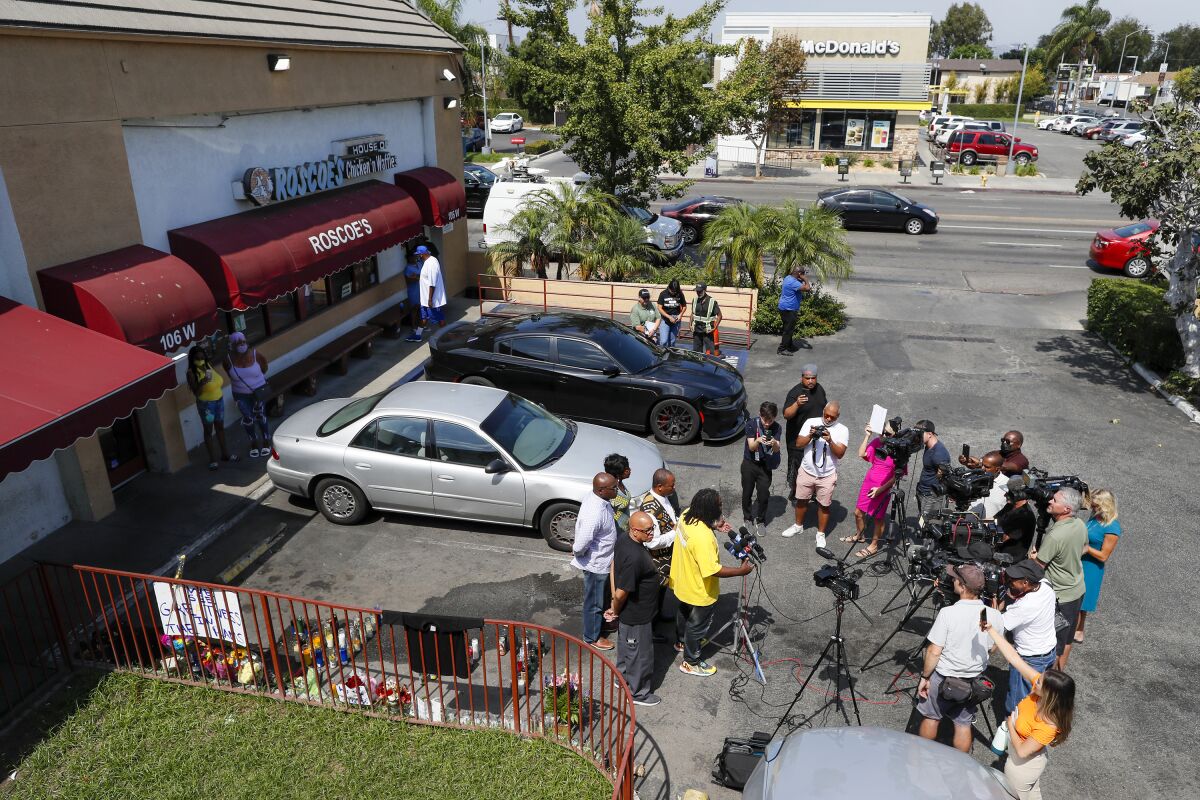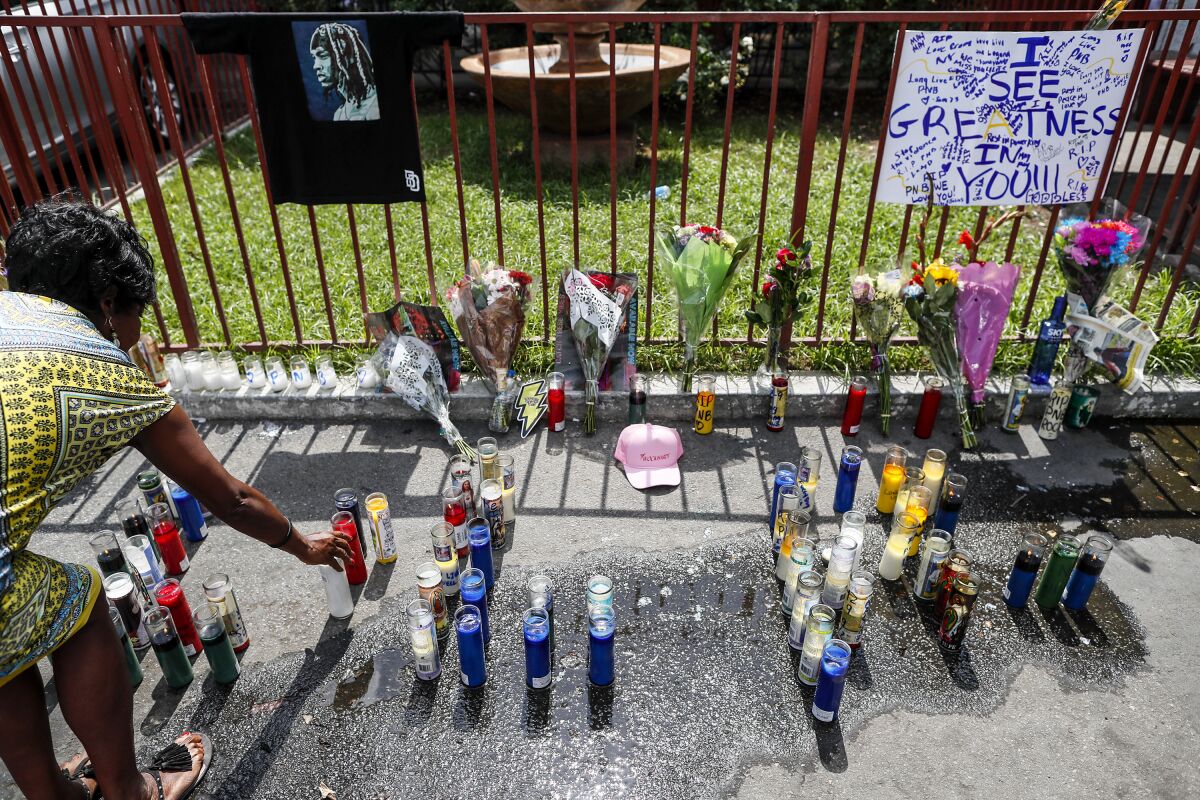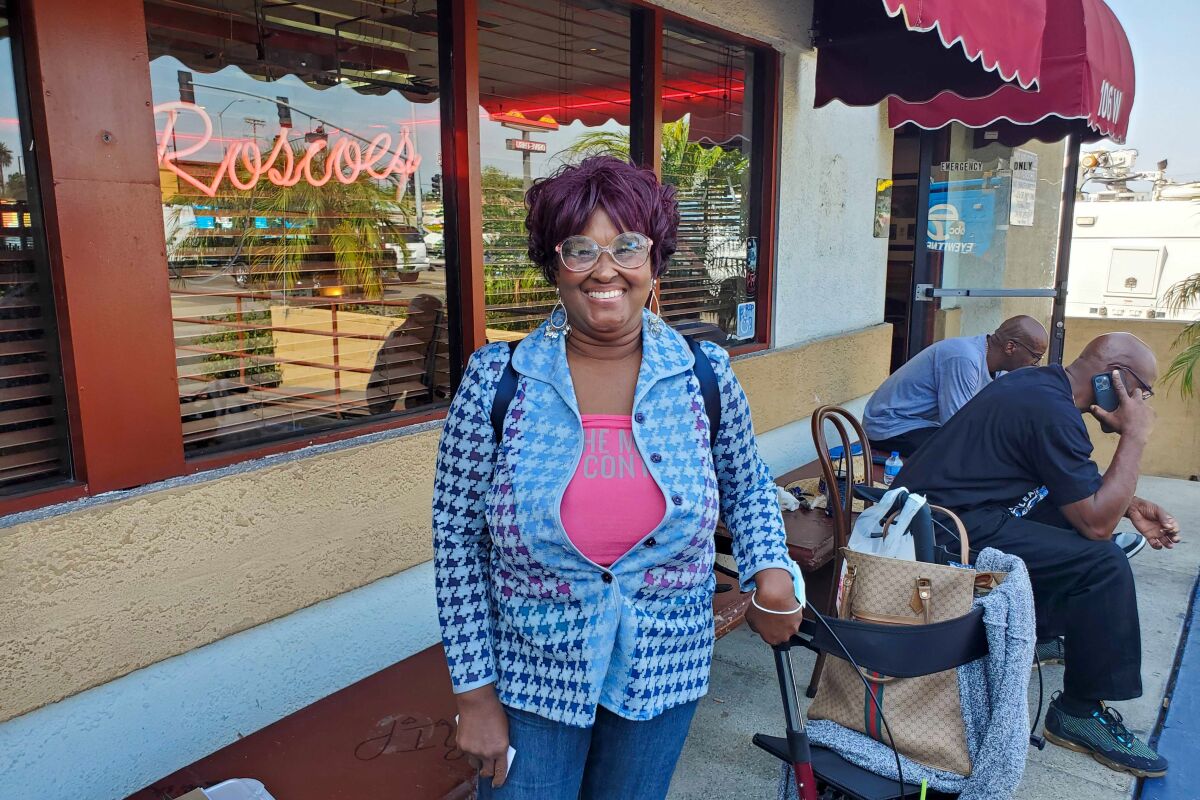The restaurant was nearly empty.
A day after the horrifying shooting death there of rapper PnB Rock, the Roscoe’s House of Chicken & Waffles on the 100 block of West Manchester Avenue at South Main Street was open but had few takers.
Except for me, and one other person.
On Tuesday, television news vans crowded the parking lot outside the restaurant, which anchors a strip mall with a liquor store. A small shrine of candles and flowers was forming against a fence near the entrance. A tall, bald-headed man acting as a host or security guard opened the glass door as I approached and asked, “Pick up or dine in?”
I pressed past camera operators and said, “I’d like to dine in.”
The host guided me to Table 12, and a server approached. It was 1:45 p.m., almost exactly 24 hours since Rock, whose real name was Rakim Allen, had been killed in what police described as a robbery attempt for his jewelry.
The death of an inspiring music figure from Philadelphia sparked an outcry about a string of violent incidents involving hip-hop artists in the Los Angeles area, including the 2019 shooting death of local icon Nipsey Hussle. Allen’s shooter remained at large.
I’ve eaten at Roscoe’s many times, but never at this location and not under such somber circumstances. I came here because, often, in the face of tragedy or loss, our instinct in Los Angeles can compel us to gather around food that we find comforting.

Chatter on social media since Monday’s shooting includes claims that the Roscoe’s location at West Manchester Avenue and South Main Street, shown Tuesday, is unsafe.
(Robert Gauthier / Los Angeles Times)
Some soul-food experts may tell you that there are better chicken and waffles to be had at other restaurants or locally grown chains. Yet Roscoe’s, over the years, has become synonymous with L.A. soul food. It is particularly beloved for its chicken-and-waffle combos, which draw boisterous eaters from breakfast time to late into the night at any of the chain’s eight locations, ranging from Long Beach to Pasadena, as well as frequent celebrity sightings in Hollywood or Mid-City.
The chain was founded in 1975 in Hollywood by Herb Hudson, a native of Harlem in New York City. In an early mention in The Times, from 1984, readers were told of the outpost on North Gower Street: “Even if you’ve never heard of Roscoe’s, some big names have; manager Jean Shaw counts among her customers Stevie Wonder, Sugar Ray Leonard, Eddie Murphy and the Rev. Jesse Jackson.”
In 1996, the late restaurant critic Jonathan Gold called the Hollywood Roscoe’s the “Carnegie Deli of L.A.’s R&B scene, a place where everybody goes, mostly because everybody goes there.” He had tepid things to say about the food, but even 25 years ago, Gold seemed to recognize that Roscoe’s had become something of an institution, a canvas for the city’s dining culture.
“At odd hours of the night, Roscoe’s hops with hip-hop gangstas and old-time crooners, funkateers and exponents of new-jack swing, athletes and bodyguards,” Gold wrote. “The pleasant reek of heated artificial maple syrup announces the presence of the restaurant more than a block away sometimes.”
This week, after the initial shock of hearing that a hip-hop artist had been shot inside a restaurant in L.A., my mind turned to the cooks and servers who may have witnessed the violence and who would likely be hoping they wouldn’t lose precious work hours in its aftermath.
“I just wish it didn’t happen here,” said John Carter, the shift lead on the floor Tuesday. “It’s not going to stop, because it’s L.A. Things happen here. It’s just too much.”
I scanned the menu and went for a waffle with chicken tenders, and added a lemonade iced tea. Staffers who peered out from the kitchen as I waited for my order seemed both bemused and relieved that anyone was in there at all.
Since Monday’s daytime shooting, social media users have hammered criticism at this Roscoe’s location, with some arguing that Allen, as a nonlocal, should have “known better” than to eat at a restaurant in a community that is harshly referred to as “dangerous” and “ghetto” — located not far from several public housing projects.
Many responses to news about the shooting suggested that Allen’s death could have been prevented if he had dined at a “safe” Roscoe’s, such as a location on Manchester Avenue in Inglewood that is frequented by people heading to or from Los Angeles International Airport.

A shrine was forming Tuesday in in the parking lot outside the Roscoe’s where rapper PnB Rock was shot and killed.
(Robert Gauthier / Los Angeles Times)
Roscoe’s did not respond to requests for comment about the reactions online. On Instagram, the chain’s official account posted a photo of Allen with an expression of condolences for his family and fans.
“The safety of our employees and guests are our utmost priority,” the post said. “We have and will continue to keep our place of business as safe as possible.”
Respondents peppered the post with negative comments.
“Move it out that hood! Everybody from L.A. knows it’s a death trap,” one user wrote, echoing a cascade of similar claims. “Either that or take more steps to protect your patrons.”
At Manchester and Main, the place is usually lively on a regular Tuesday, Carter said. But there were no gaggles of teens or groups of friends, no work-a-day regulars and no cuddly dates like the kind I’d imagine Rock and his girlfriend would have been having before Monday’s fateful confrontation.
Otherwise, the vibe was just as artfully composed as locals have come to expect from the Roscoe’s brand: A perimeter of a single, pink neon tube lined the edge of the ceiling; a framed photo of former President Obama hung near the cash register, showing him waving broadly outside the chain’s well-worn Pico Boulevard location. A soundtrack of beloved R&B classics played at a volume just above background-level but agreeably so for a soul-food spot.
My plate arrived, as reliable as Roscoe’s itself. A disc of a relatively thin waffle, crowned with a dollop of butter. Three tenders coated in a crumbly, somewhat sweet fry. A plastic tumbler of lemonade and ice, with a floating wash of brown iced tea on top.

Rosa Miller, 60, was the only the other diner having lunch at Roscoe’s at Manchester and Main precisely 24 hours after PnB Rock was shot and killed.
(Daniel Hernandez / Los Angeles Times)
As I ate, Carter shuffled around, putting chairs over tables, seat-down, as if the restaurant were closing. It didn’t seem likely that anyone else would be coming in. The place normally closes at 8 p.m., he said, far earlier than other locations.
His best seller? The Obama Special: three wings served with a waffle, potato salad and French fries.
“All of our employees — cooks, everyone — has worked here for 10 years or more,” Carter said. “It’s going to take time, but it will get back to normal. It’s just gonna take a lot of time.”
The only other diner besides myself was Rosa Miller, 60, who wore purple-dyed hair and moved with a walker.
“I just came to pay my respect for the youngster, because they’re our next generation, and it has to stop,” Miller told me. “The violence has to stop, because you can’t even go out to eat.”
She added: “I had the chicken and waffles, and it was good, too.”


